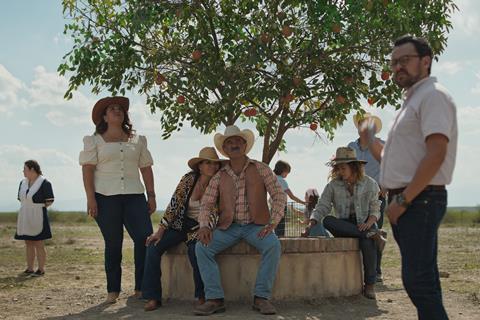Alejandra Marquez Abella’s third feature is a powerful blend of class drama and classic Western, set on a Mexican ranch

Dir: Alejandra Marquez Abella. Mexico. 2022. 116 minutes.
A premonition of end times hangs like a storm cloud over Don Reynaldo’s ranch, the sole location of Alejandra Marquez Abella’s powerful third feature. In the northern Mexican state of Nuevo Leon, near the border with Texas, it’s a buen retiro from the urban life of Monterrey for this well-off if not ultra-rich patriarch and his extended family. But the foundation myth involving his father, a rifle and a cougar that Reynaldo reels off to his children and grandchildren like a surrogate real estate deed is just that – a myth. Facts are so much more real. Facts like the resentment that has festered for years in ranch hands he pretended were ‘just like family’, but paid and worked like indentured servants. Facts about drug money, not land, being king in this part of Mexico. Or the fact that Reynaldo – who has the hunter walk, the hunter jeep, the hunter guns and the hunter garb – can’t hit a deer to save his life.
A twilight Western, about characters who no longer fit into the place they think of as home.
In a way, Northern Skies Over Empty Space is a companion piece to its director’s well-received second feature The Good Girls, launched at Toronto in 2018. There too, an elaborately constructed lie of a lifestyle turned out to be running, quite literally, on empty as the 1982 Mexican debt crisis hit home. But right from its title – taken from one of the more mystic, apocalyptic verses of the biblical Book of Job – Alejandra Marquez Abella’s Berlinale Panorama premiere ticks a different genre box and channels other cinematic ancestors.
If The Good Girls put a female director’s spin on ‘men’s women’s films’ like Cukor’s The Women (whose 1939 tagline was “It’s All About Men!”) or Antonioni’s Le Amiche (1955), Northern Skies Over Empty Space works a switch and bait. For the first 40 minutes or so, we settle into a cool skewering of the Mexican upper-middle class that carries echoes of Carlos Reygadas or Michel Franco. Gradually, however, it dawns on us that we’re watching a twilight Western, about characters who no longer fit into the place they think of as home.
It’s the bravura of the transition between bleak class drama and Western, and the way the two genres co-exist and bleed into one another, that makes Marquez Abella’s third feature so rich. But the audience is also gifted two standout performances, by Gerardo Trejoluna as the hapless hunter-landowner and Paloma Petra as a long-suffering maid and ranch hand. All this should fire up sales for a film that engaged arthouse audiences will certainly respond to.
Two varieties of confusion spread like an oil slick over the opening scenes. One is visual: when we first meet Don Reynaldo (Trejoluna), his brother Arnulfo and the intense, silent Rosa (Petra) on a hunting foray in the scrubby red dirt brush country, there are occasional warps and slippages in what we see, as if we’re looking through unfocussed binoculars. The other has to do with narrative reticence. It takes a little while to work out that Rosa, tough but always on edge, is not the Don’s daughter but his most resourceful employee, and a while more before we sort out the family relationships that link those who have gathered here to celebrate the ranch’s twentieth anniversary. Don Rey’s son with his city ways and failing marriage is a disappointment, while his two grown up daughters seem to have turned up mostly to keep dad happy rather than because of their love for the place. The family member who seems most settled here is Reynaldo’s wife Sofia (Dolores Heredia), who we suspect has married upwards, and who can switch from country casual to urban glamour at will.
But she can also read the signs more clearly than her self-deceiving husband. Signs like the cattle that were burnt at her brother-in-law’s nearby, or that never-explained “thing that happened to the Ramoses”, or the two luridly menacing bad guys, the first introduced via a vertical Spaghetti Western pan from the boots up, who turn up to ruin a family lunch with their thinly veiled demands for protection money. In a nod at the Corbucci style of grimly funny Western, we even get a morose clown and lost Easter Bunny dropped into the mix. But it’s Rosa – another strong, determined, practical woman – who becomes the film’s centre of gravity as Don Rey loses touch with reality and spins towards an act of pointless heroism. Solid and grounded, she is of this land as much as the praying mantises, goats, frogs and other creatures, shots of which are edited into the narrative in silent proof of Sofia’s clear-eyed observation that “the ranch is just mesquite tree and dust – that’s it”.
Production companies: Bengala, La Tuna, Amacinema, Gavilan Cine
International sales: Adán Pérez, Bengala, Adan@agenciabengala.com
Producers: Gabriel Nuncio, Alejandro Duran, Adan Perez, Alejandra Marquez Abella
Screenplay: Gabriel Nuncio, Alejandra Marquez Abella
Production design: Sandra Cabriada
Editing: Miguel Schverdfinger
Cinematography: Claudia Becerril Bulos
Music: Tomas Barreiro
Cast: Gerardo Trejoluna, Paloma Petra, Dolores Heredia, Juan Daniel Garcia Trevino, Mayra Hermosillo, Francisco Barreiro, Mariana Villegas, Fernando Bonilla, Raul Briones, Marco Garcia
























